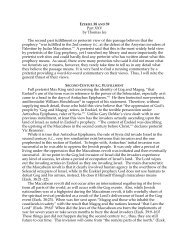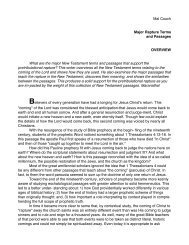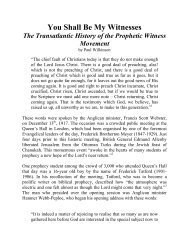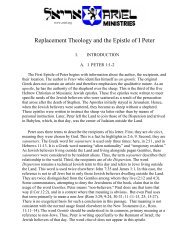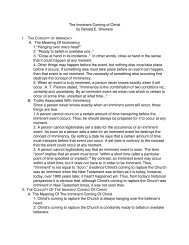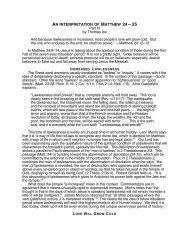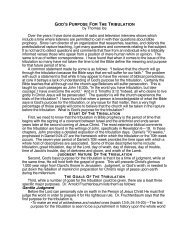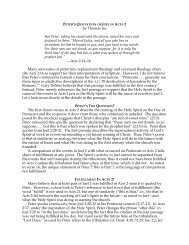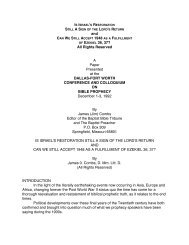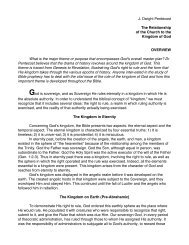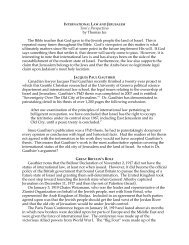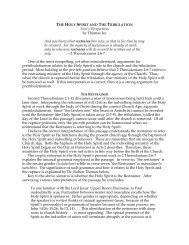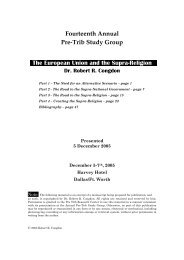PDF version - Pre-Trib Research Center
PDF version - Pre-Trib Research Center
PDF version - Pre-Trib Research Center
Create successful ePaper yourself
Turn your PDF publications into a flip-book with our unique Google optimized e-Paper software.
Christian Zionism History — Ice — Page 14<br />
His Majesty’s Government view with favour the establishment in<br />
Palestine of a national home for the Jewish people, and will use their best<br />
endeavors to facilitate the achievement of this object, it being clearly<br />
understood that nothing shall be done which may prejudice the civil and<br />
religious rights of existing non-Jewish communities in Palestine, or the rights<br />
and political status enjoyed by Jews in any other country. 133<br />
Before the Balfour Declaration was finally issued, much discussion with allies and<br />
behind the scene discussion took place. Prime Minister, Lloyd George wanted to make<br />
sure that the United States was fully on board before it was issued. <strong>Pre</strong>sident Woodrow<br />
Wilson would support it and on October 1918 issued the following statement of<br />
acceptance:<br />
I welcome an opportunity to express . . . satisfaction . . . in progress . . . since<br />
the Declaration of Mr. Balfour on . . . the establishment in Palestine of a<br />
National Home for the Jewish People, and his promise that the British<br />
Government would use its best endeavors to facilitate the achievement of that<br />
object . . . all America will be deeply moved by the report [on the founding] of<br />
the Hebrew University at Jerusalem with the promise that bears of spiritual<br />
rebirth. 134<br />
The impact of the Balfour Declaration was a tremendous event within the Zionist<br />
movement. Since Britain was on the verge of controlling Palestine, it provided a great<br />
step on the road to the founding of the nation of Israel in 1948. This great declaration<br />
was spearheaded, not just by British geo-political concerns, as important as that was<br />
within their thinking, but by Christian sympathies that were formed by biblical beliefs.<br />
Lord Balfour does not appear to have been moved by his views of eschatology,<br />
although it may have been a factor, “but simply exiles who should be given back, in<br />
payment of Christianity’s ‘immeasurable debt,’ their homeland.” 135<br />
David Lloyd George (1863–1945) was British Prime Minister (1916–1922) when the<br />
Balfour Declaration was issued. Balfour and Lloyd George were both life-long friends.<br />
From Wales, Lloyd George was steeped in the Bible in which he was trained as a youth.<br />
This clearly predisposed him to view with favor the Zionist movement. Saddington<br />
says:<br />
It was Lloyd George’s decision that was primarily responsible for the<br />
British launching a large-scale offensive to conquer all of Palestine despite the<br />
risks. As a Christian Zionist he was determined to gain control of Palestine<br />
without the French to interfere. He also wanted his country to carry out what<br />
he regarded as God’s work in Palestine. 136<br />
Lloyd George made a number of statements concerning his biblical upbringing<br />
which influenced him throughout his life. “Lloyd George recalled how in his first<br />
meeting with Chaim Weizmann in December 1914, place names kept coming into the<br />
conversation that were ‘more familiar to me than those of the Western front,’” notes<br />
Tuchman. “Lord Balfour’s biographer says that his interest in Zionism stemmed from<br />
his boyhood training in the Old Testament under the guidance of his mother.” 137 On<br />
another occasion, when speaking about the Balfour Declaration, Lloyd George said:



